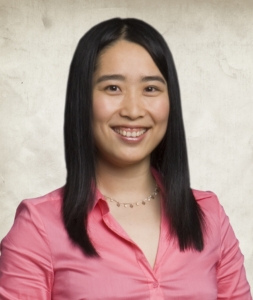 Molly Tu is a strong believer that you can get everything you want, but just not at the same time. For her, workwise, that means understanding that early in your career you might be able to go up like a rocket, but then at certain points you have to be more flexible and adapt your plan, constantly re-evaluating and re-defining what success is for you at any given moment.
Molly Tu is a strong believer that you can get everything you want, but just not at the same time. For her, workwise, that means understanding that early in your career you might be able to go up like a rocket, but then at certain points you have to be more flexible and adapt your plan, constantly re-evaluating and re-defining what success is for you at any given moment.
Tu started her career working for two large professional firms in China but satisfied her desire to experience the world by coming to the United States to attend business school at Columbia. After graduation, she decided she wanted to turn her career path to the corporate side, and recognizing the potential in the information industry, she started with Thomson Reuters’ rotational program. There she experienced everything from M&A to investor relations to product management, ultimately deciding to join global account management, a division whose goal is to constantly assess how to deliver increased value to Thomson Reuters’ largest customers. There she spearheaded the Geneva Program, for which she received the 2014 Chairman’s Award.
And, less than a year ago, she was named to her current role, where she is tasked with rolling out the Geneva Program companywide.
“I have always viewed my experience here as similar to working in a startup, but still being part of a large company,” Tu says. “It is very satisfying to transform business processes and also help customers at the same time.”
“I have always viewed my experience here as similar to working in a startup, but still being part of a large company,”
Sponsors in the Workplace; Role Models Close to Home
Tu knows that sponsorship is key to corporate success. “As I grew in my career, my mentors and sponsors were the people who directed me to look at new things in different ways, and that vision got me to places I would not have otherwise.”
She’s often asked how to find a sponsor, but her experience is like many — professionals don’t seek out their own sponsor, but rather it happens in a more organic process that usually involves managers with whom you’ve worked or who otherwise are familiar with your work and want to champion the traits you offer that will allow you to succeed in increasingly responsible roles.
“At the end of the day, sponsorship comes from faith in you as a person, and there has to be an accumulation of experience to build that trust.”
In terms of role models, Tu found hers much closer to home — her grandma. Tu has always been inspired by how she puts her heart and soul into work about which she is highly passionate, including risking her life in the founding of new China. When she retired, she raised money on her own to preserve folk music in her area of China.
“Her passion and satisfaction remind me to always focus on what is meaningful,” Tu says, and that includes defining success by pursuing something you love. “Even if your life might appear to be successful in the eyes of those around you, deep in your heart you won’t be satisfied if you’re not doing something you love.”
She notes a famous quote by Confucius that sums up that philosophy. “Choose a job you love, and you won’t have to work a single day in your life.”
Different, Yet the Same
Throughout her working life, Tu has frequently found herself in environments quite different from where she came from, and that has led to many observations about adapting to these differences. But then she finds that she soon spies commonalties amidst the differences and has realized that people are fundamentally very similar.
“Seeing the commonality helps me address challenges with other people,” she says, adding that her work to reshape the company’s business practices would be unimaginable if she wasn’t able to find the similarities in cultures and genders.
Her company has a strong focus on diversity, including many programs for women. One in which she has been active is the Leadership Program for Women (LPW), which is a training program and forum where women across regions, functions and businesses form a community to bring in professional trainers twice a year. “There are unspoken business rules pertaining to women so this group finds professionals who really know the space and can share what’s happening and how we can maximize and leverage our positions.” She also helps plan events as part of Women at TR, which is designed to develop the talents and champion the contributions of female employees, thus promoting women as equal partners in the success, achievement, and profitability of Thomson Reuters.
“There are unspoken business rules pertaining to women so this group finds professionals who really know the space and can share what’s happening and how we can maximize and leverage our positions.”
One example related to the Geneva Project, where women volunteer to apply their specific skills to understand and better position different products for the company’s largest customers.
“Sometimes women tend to get tied up 100 percent with their current task and don’t always look at other opportunities. Being involved in these types of projects allow you to build your network, for example by having the chance to interview sales people and customers, to extract the information we need that will be useful to others.”
Juggling Work and Family
Away from the office, Tu focuses on her 16-month old daughter. She has found that balancing work and family responsibilities has helped her view her career in a more strategic way, knowing that there are times that you won’t be able to focus 100 percent on her career. However, it also drives women to become more effective and prioritize better; in short, to work smarter rather than harder.
“I feel lucky for the advice I’ve gotten, often as part of the women’s groups, on how you have to work with your partner to focus on balance.” As many senior women leaders have told her, they can only do what they do because they have a supportive spouse. She has realized that whether it’s work or family, more gets done when everyone works together.

